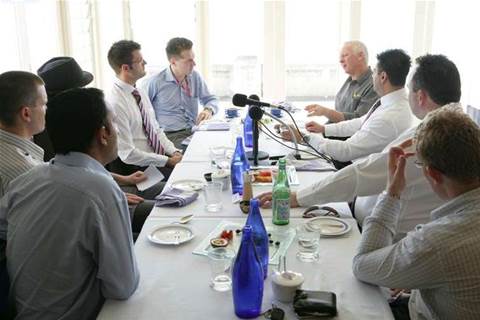CRN: The remote office / mobile workforce space has been talked about for a long time. Most of the conversations I've had have always been around the enterprise side of things. It seems to have exploded in the last year - suddenly everyone seems to have a smartphone, tablets are popping up. I think it's really exciting and a big opportunity for resellers who might not even realise there is an opportunity there.
How are businesses making the transition to mobile workforces?
Leon Friend, Avnet: We see a lot of SMBs asking for help combining different vendors and different technologies, because we are seeing a lot of smartphones and tablets starting to appear in design requests.
Often people have bought products that don't do what they want because they've not thought about all [the parts required].
For example, the other day a customer bought a couple of firewall routers that they wanted to put up in a high availability configuration and then realised they had only one internet link and no ability to actually do what they wanted. It's a bit of a mess really...
CRN: Are there any common areas that people overlook?
Friend: I think it's really they just need to step back and look at what they're actually trying to achieve. Usually it starts off as organic growth - give this guy access via his smartphone and it might work for one or two people, but as soon as you hit three it becomes unmanageable and a complete mess. So if we sit down and look at that then you can sort of cover it off...
CRN: When you say complete mess, what are the problems that emerge?
Friend: Management, controlling who has access, protecting your network. Sometimes it's about data loss, things copied down onto your home computer. We have some situations where we talk about data loss prevention and the data security suites that allow us to protect the end-point and control what is copied to memory sticks...
CRN: SMBs just want the flexibility but don't want to have to start paying for it
Friend: Yes, they don't actually think about it...
Scott Penno, Allied Telesis: It's one thing to say gee, it's going to cost me a lot to get someone like NSC involved to put all this together, but there's probably a much greater price paid for a loss of information, either because you can't get your hands on it or that might have been the only copy.
Friend: SMBs seem to focus more on the anti-virus side of it, viruses getting in their network and not realising that a lot of the time what is higher cost. If they get a virus in their network they can clean it up relatively easily, but if they lose the data it's gone.
Scott McKinnel, Check Point: There a number of factors in the SMB space - the lack of an IT professional, the size and cost-sensitive nature. They're influenced not by a singular CXO who is giving steerage to the strategy but moreso around barbecues and people that they know.
[Their decisions are made] without good strategy, without good skills and knowledge about how to formulate security best practices and so on and subsequently, as you say, it's a hell of a mess because there's a lack of control and no consistent management.
The frustration I find is convincing people they need stuff without them thinking you're just trying to flog them another product.
They're reluctant sometimes to take that up because they don't see me as an influence, they see me as a sales person trying to sell them something. So they take their influence from their neighbour or their friend who is not trying to sell them anything but typically is giving them outdated advice.
I've got a neighbour down the street who works from home in a little marketing business. He's got a bit of anti-virus on that machine, he's got a different one on this one - one day he'll get an idea from someone and go and change something or change his phone to something else.
They don't really understand the threat and it is a challenge I think to try and give good advice.
Rob Pregnell, Symantec: The technology is there and the services are there. SMBs by nature I think are pretty self-sufficient, they've been doing things themselves because that's the way it goes in that space...
Penno: Maybe that's the difference - Scott sees a need for that external assistance and is struggling to find an organisation to help him out. A lot of SMBs try to take on as much as they can themselves because they don't want to engage someone externally to do that for them...
Pregnell: Yes, they're reluctant to and are afraid of the perception of the high cost.
The other thing that hasn't yet been mentioned is the often very dramatic impact of a breach. An SMB with a virus threat for instance will literally take themselves off for half a day or a day or two while they fix it, whereas the larger organisations can isolate the threat and essentially keep the ship running.
When it does happen there's actually dramatically more impact to that business than it would be if it was a larger organisation.
Next: CRN: Part of the problem is that because they're small businesses only their customers are affected other than themselves, so there's much less opportunity for breaches to be reported.







_(21).jpg&h=142&w=230&c=1&s=1)





.jpg&w=100&c=1&s=0)








_(1).jpg&q=95&h=298&w=480&c=1&s=1)


